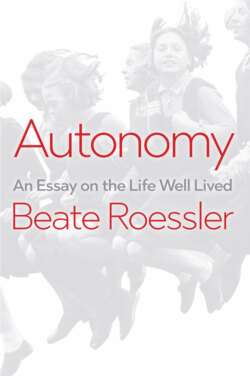Autonomy

Реклама. ООО «ЛитРес», ИНН: 7719571260.
Оглавление
Beate Roessler. Autonomy
Table of Contents
Guide
Pages
Autonomy
Dedication
Autonomy. An Essay on the Life Well Lived
Copyright Page
Preface to the English Edition
Preface
Introduction: Autonomy in Everyday Life
Notes
1 What is Autonomy? A Conceptual Approach
Remarks on the history of the concept
Negative freedom, positive freedom, autonomy
Conditions of individual autonomy
Autonomy and rational plans
Notes
2 Ambivalences
Various forms of ambivalence
Ambivalence as a disease of the will
Is an ambivalent will a healthy will?
The ambivalent self
Conflicts of ambivalence as conflicts of identity
Autonomy and the acceptance of conflicts
Notes
3 Autonomy and the Meaning of Life
Why do we value autonomy?
Sisyphus contented
Does the meaning of life consist in the satisfaction of desire?
The objective meaning of life
Mill’s crisis and subjective meaning in life
When does the question of meaning arise?
Notes
4 Autonomy, Self-Knowledge, and Self-Deception
Self-knowledge and self-determination
Self-deception: how can I be mistaken about myself?
How can self-knowledge fail? On fundamental epistemic uncertainties
The quantified self
Notes
5 Autonomy, Self-Thematization, Self-Examination: From Diaries to Blogs
Self-examination, self-control, reflection
Why diaries? And which diaries?
Autonomy in the diary: examples
Blogs and the new technologies of self-examination
What is the framework of autonomy?
Notes
6 Autonomous Choice and the Good Life
The question of the good life and perfectionism
Happiness, autonomy, and meaning
The significance of choosing: conditions of an autonomous decision
Who actually chooses and in what context?
Alienation (and authenticity)
Virtue and character
Notes
7 Private Life
Why privacy?
Dimensions of privacy
Informational privacy, social relationships, and autonomy
Autonomous persons in relationships (I)
Autonomy and domestic privacy: autonomous persons in relationships (II)
Privacy and democratic society
Notes
8 Social Preconditions of Autonomy
What are social conditions?
The social constitution of autonomy
Autonomy, ideology, and adaptive preferences
Social opportunities and justice
Between autonomy and oppression: limiting cases
Notes
9 The Reality of Autonomy
Autonomy is not an illusion
The significance of social practices
Social unfreedom and implicit bias
Aspects of moral responsibility
Autonomy and the life well lived
Notes
Bibliography
Index
POLITY END USER LICENSE AGREEMENT
Отрывок из книги
In everyday life, we generally assume that we can make our own decisions on matters which concern our own lives. We assume that a life followed only according to decisions taken by other people, against our will, cannot be a well-lived life – we assume, in other words, that we are and should be autonomous. However, it is equally true that many aspects of our lives are not chosen freely: this is true of social relations and commitments but also of all those situations we simply seem to stumble into, situations which just seem to happen to us. The possibility of both the success of an autonomous life and its failure are part of our everyday experiences.
In this brilliant and illuminating book, Beate Roessler examines the tension between failing and succeeding to live an autonomous life and the obstacles we have to face when we try to live our life autonomously, obstacles within ourselves as well as those that stem from social and political conditions. She highlights the ambiguities we encounter, examines the roles of self-awareness and self-deception, explores the role of autonomy for the meaning of life, and maps out the social and political conditions necessary for autonomy. Informed by philosophical perspectives but also drawing on literary texts, such as those of Siri Hustvedt and Jane Austen, and diaries, including those of Franz Kafka and Sylvia Plath, Roessler develops a formidable defense of autonomy against excessive expectations and, above all, against overpowering skepticism.
.....
In chapter 3, I ask why autonomy is in fact so valuable and important. I pose this question as the question of the relationship between autonomy and the meaning of life. Is a life meaningful only if it is autonomous? And can it be meaningful – and autonomous – without being happy? Must it be objectively meaningful, or is it enough if it can be understood as autonomous and subjectively meaningful? Here again, I shall draw on literary examples in order to better understand these tensions or contradictions and to demonstrate the constitutive connection between self-determination and meaning in one’s own life.
Persons who act autonomously know what they think and know what they want. That is, in order for individuals to be able to act and live autonomously, they must know themselves. But how – after Freud – can we demand self-transparency as a condition of autonomy? Chapter 4 considers the question of what form of self-awareness and self-knowledge we can reasonably attribute to an autonomous person, given the widespread phenomenon of self-deception. I also discuss whether or not new “self-tracking technologies” are in fact capable of contributing to self-knowledge and thus promoting autonomy.
.....